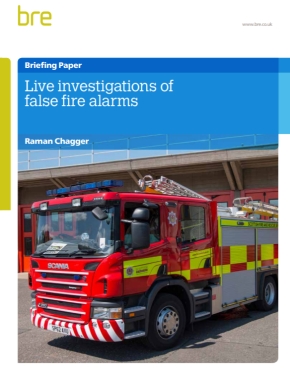Live investigations of false fire alarms
Live investigations of false fire alarms was written by Raman Chagger and published by BRE in December 2015. Recommendations made as a result of this project can help to significantly reduce the occurrence of false fire alarms.
Fire detection and fire alarm systems (FDFAS) are used to provide early warning of fire in order to alert the local Fire and Rescue Service (FRS). FRS attendance at fires saves lives, prevents injury and reduces associated property damage costs.
However, false alarms attribute to estimated losses of around £1 billion a year, resulting in disruption and loss of productivity for businesses. False alarms have the potential to divert fire and rescue services away from real fires, and also reduce the confidence of the general public in fire alarms. Despite this there is no single organisation responsible for investigating false alarms or providing guidance on reducing them.
This research aimed to identify the fundamental causes of false fire alarms, utilising a fire alarm industry expert to investigate false alarms as they occurred in the field in the greater Glasgow area. A comprehensive online questionnaire containing 124 questions was developed to enable the fire alarm investigator to record all details of the false alarms attended. This form of live investigation of false alarms had not previously been attempted. The fire alarm investigator assisted Scottish Fire and Rescue Service crews as they attended live callouts and, following a comprehensive investigation, completed online reports for each false alarm.
Data from his accounts and from 65 false alarm reports, gathered from November 2014 to April 2015, were analysed and 35 recommendations were made. These can significantly reduce false alarm occurrences and contribute to the greater integrity and reliability of fire detection systems.
The recommendations were made across nine different stakeholder groups, ensuring that fire and rescue services, fire risk assessors, business owners, fire alarm contractors, trade associations and others can all play their part in collectively reducing false alarms in the UK.
The contents of the briefing paper are:
- Summary.
- Abbreviations and glossary of terms.
- Introduction.
- Methodology.
- Summary of data gathered.
- Findings and recommendations.
- Future work.
- Conclusions.
- References.
The free briefing paper can be downloaded at: https://files.bregroup.com/research/Live-Investigations-of-False-Alarms_2015-December.pdf
[edit] Related articles on Designing Buildings Wiki
- BRE articles on Designing Buildings Wiki.
- Carbon monoxide detector.
- Fire detection and alarm system.
- Fire protection engineering.
- Fire.
- Heat alarm.
- Ionisation smoke alarm.
- Multi-sensor alarm.
- New requirements for fire detection and alarm network systems IP 12 13.
- Optical smoke alarm.
- Over £1 billion lost every year due to false alarms.
- Project SHOUT.
- Smoke alarm.
- The causes of false fire alarms in buildings.
Featured articles and news
Restoration and renewal of the Palace of Westminster
A complex project of cultural significance from full decant to EMI, opportunities and a potential a way forward.
Apprenticeships and the responsibility we share
Perspectives from the CIOB President as National Apprentice Week comes to a close.
The first line of defence against rain, wind and snow.
Building Safety recap January, 2026
What we missed at the end of last year, and at the start of this...
National Apprenticeship Week 2026, 9-15 Feb
Shining a light on the positive impacts for businesses, their apprentices and the wider economy alike.
Applications and benefits of acoustic flooring
From commercial to retail.
From solid to sprung and ribbed to raised.
Strengthening industry collaboration in Hong Kong
Hong Kong Institute of Construction and The Chartered Institute of Building sign Memorandum of Understanding.
A detailed description from the experts at Cornish Lime.
IHBC planning for growth with corporate plan development
Grow with the Institute by volunteering and CP25 consultation.
Connecting ambition and action for designers and specifiers.
Electrical skills gap deepens as apprenticeship starts fall despite surging demand says ECA.
Built environment bodies deepen joint action on EDI
B.E.Inclusive initiative agree next phase of joint equity, diversity and inclusion (EDI) action plan.
Recognising culture as key to sustainable economic growth
Creative UK Provocation paper: Culture as Growth Infrastructure.
Futurebuild and UK Construction Week London Unite
Creating the UK’s Built Environment Super Event and over 25 other key partnerships.
Welsh and Scottish 2026 elections
Manifestos for the built environment for upcoming same May day elections.
Advancing BIM education with a competency framework
“We don’t need people who can just draw in 3D. We need people who can think in data.”
























